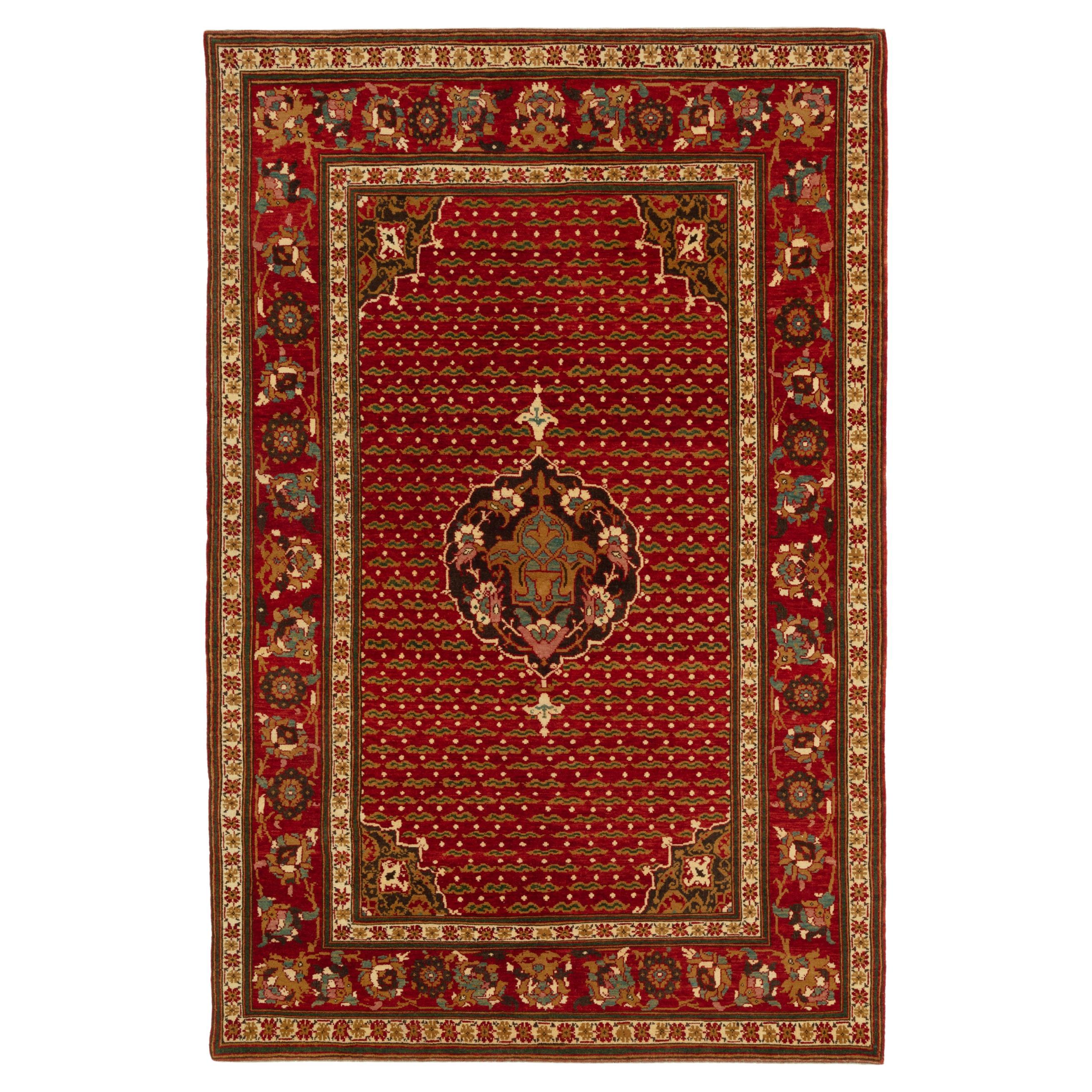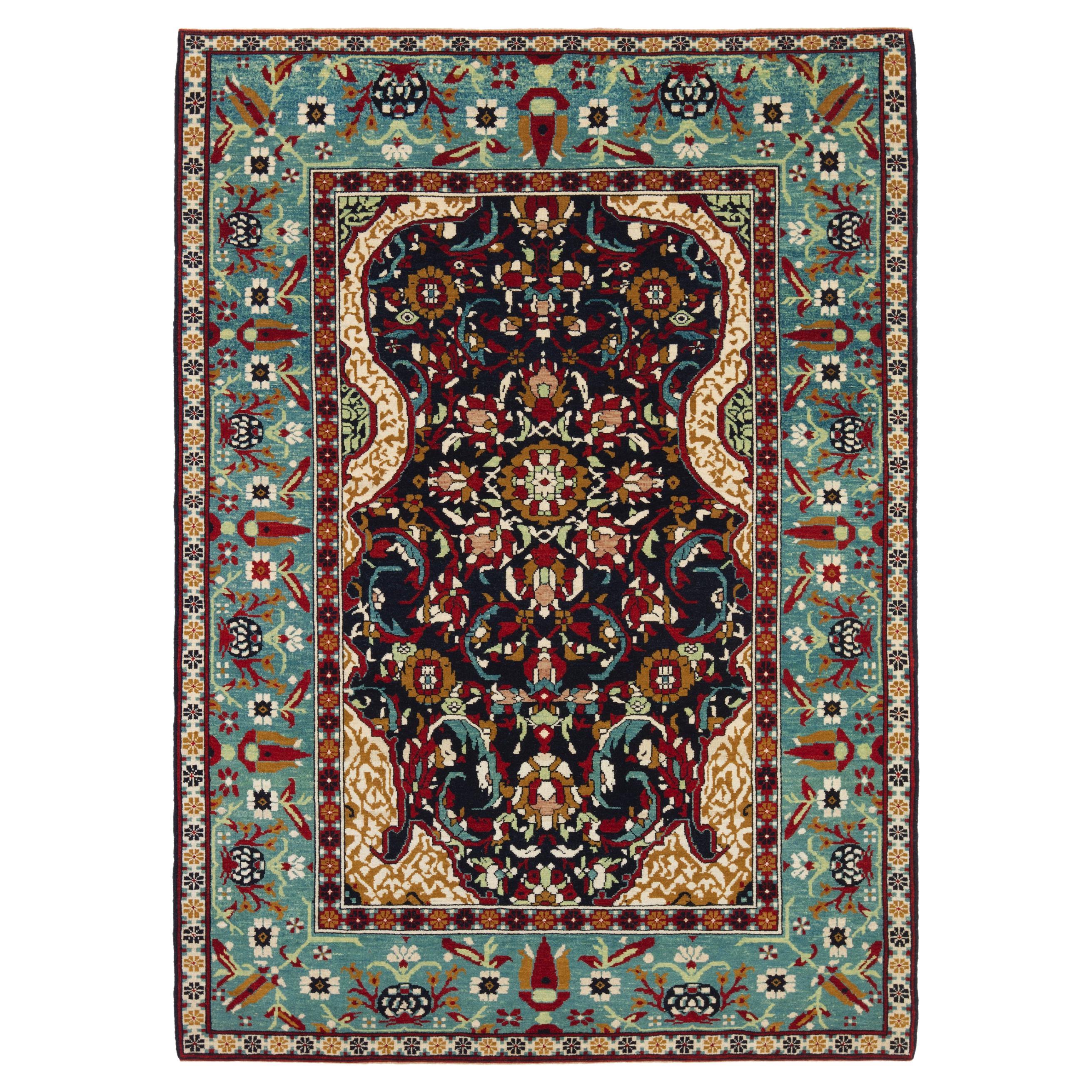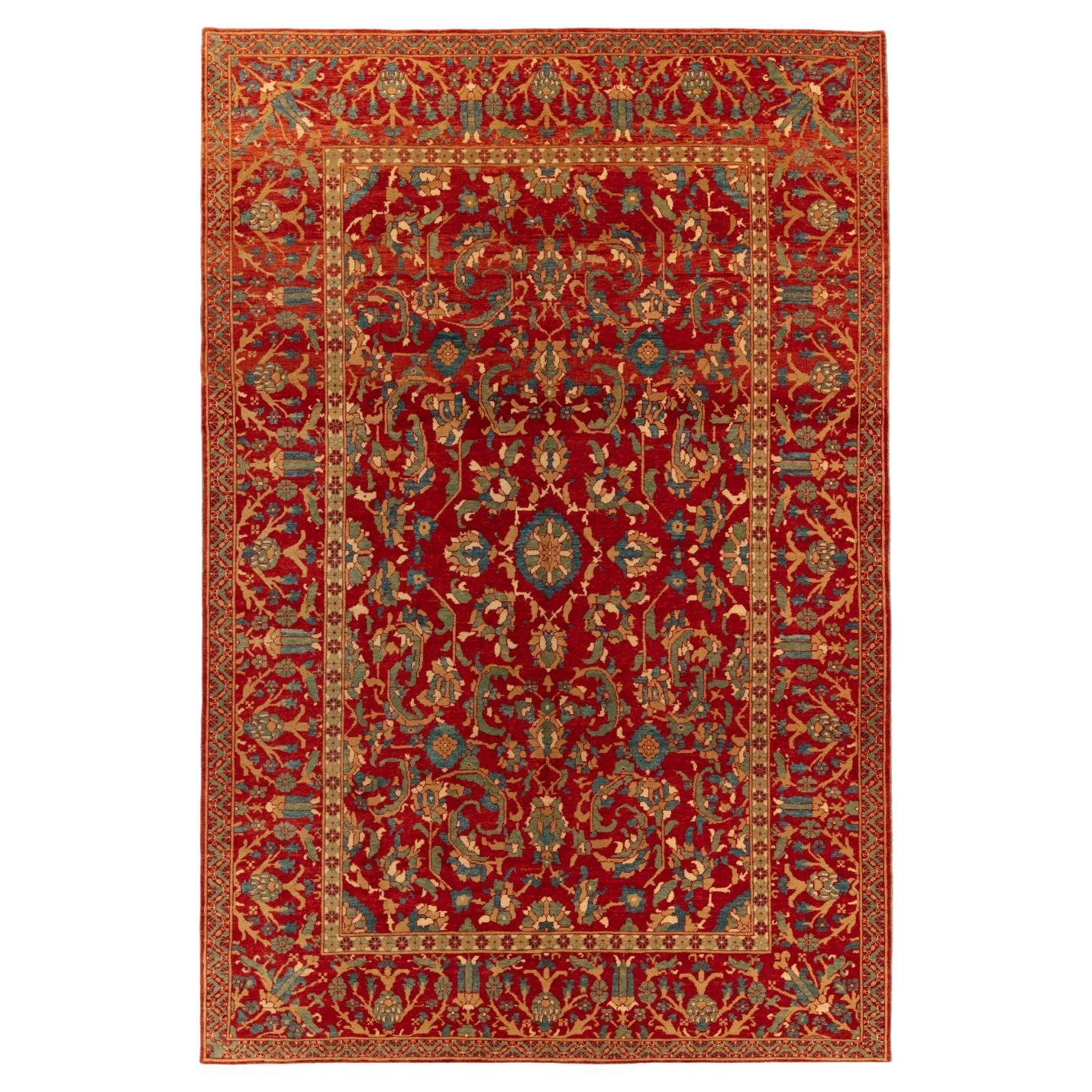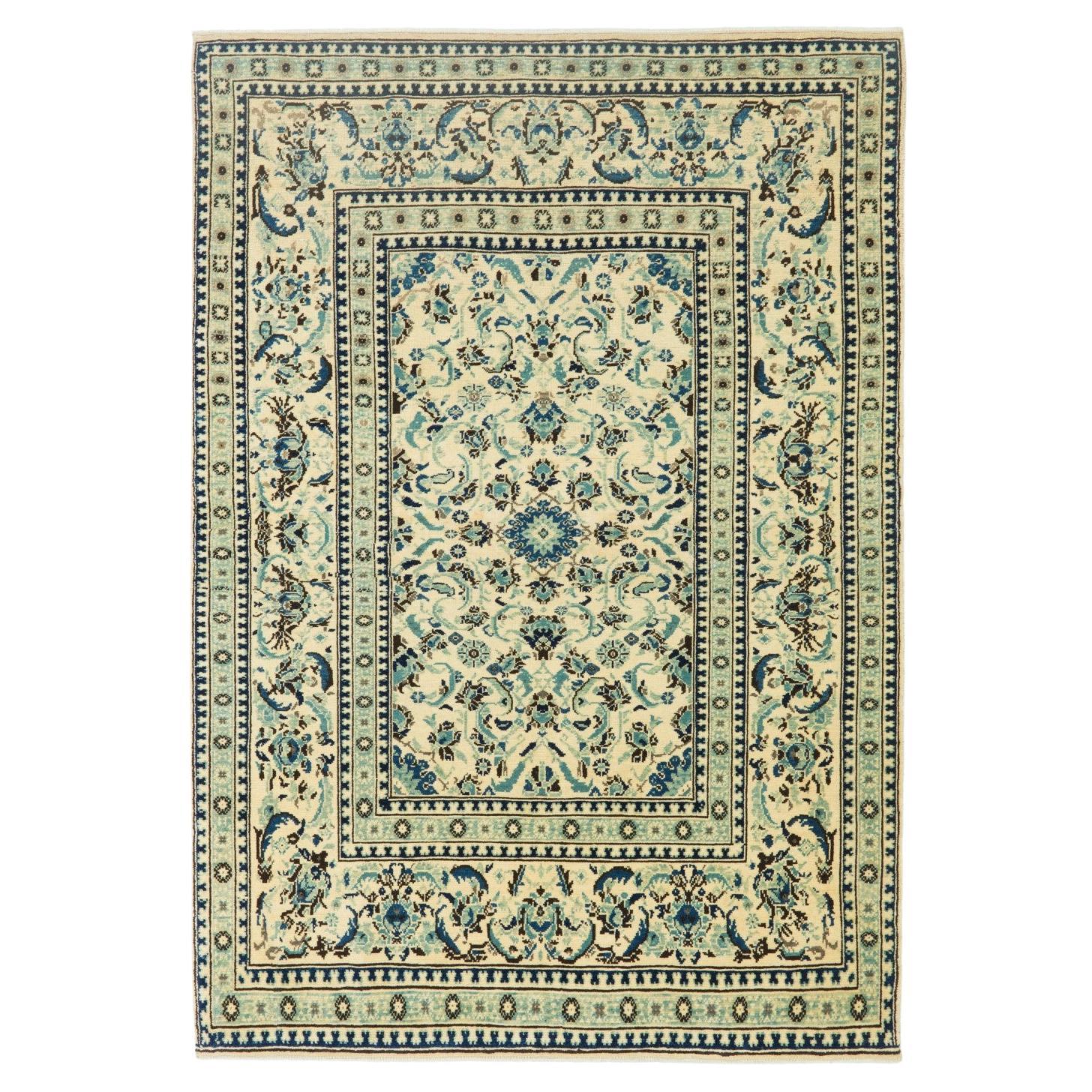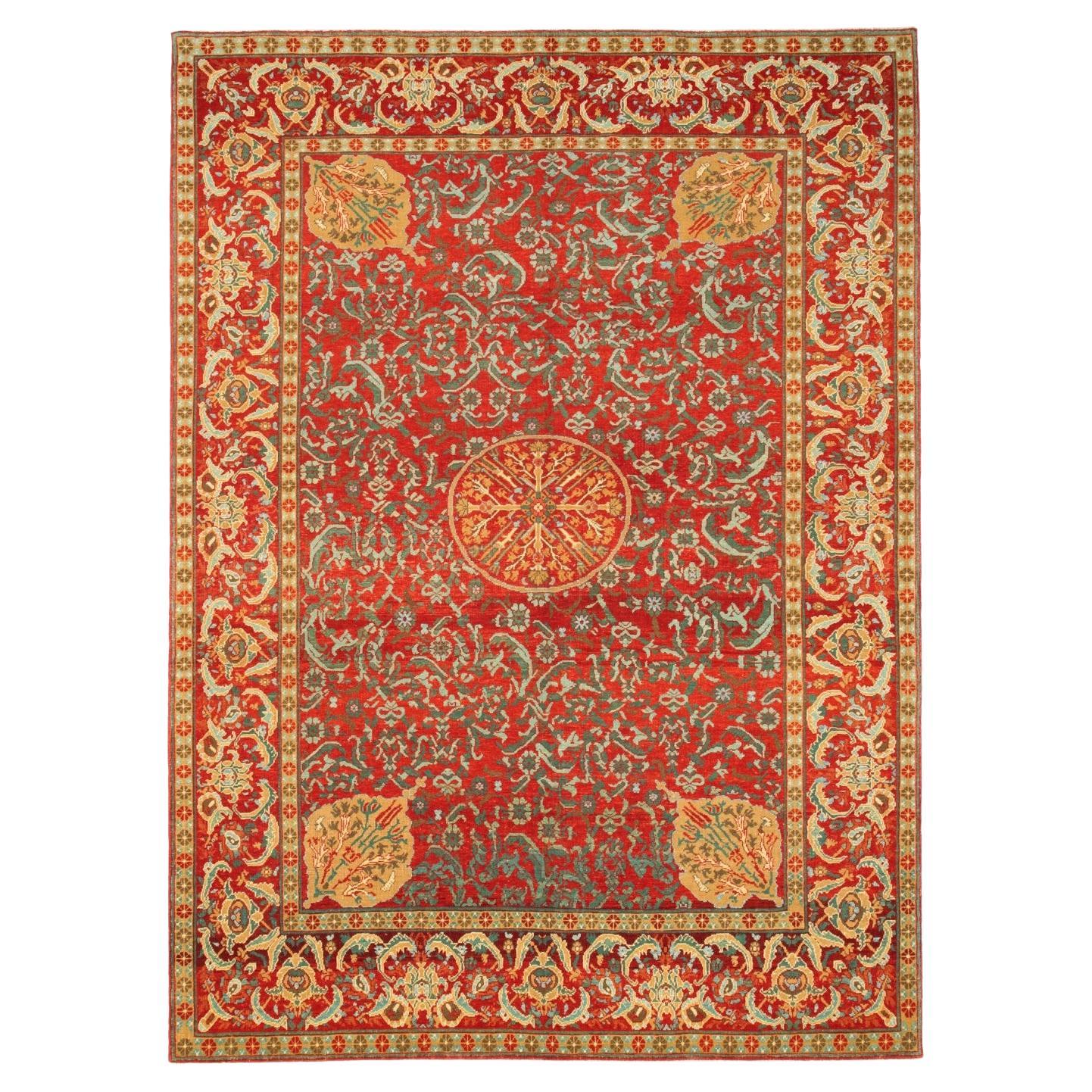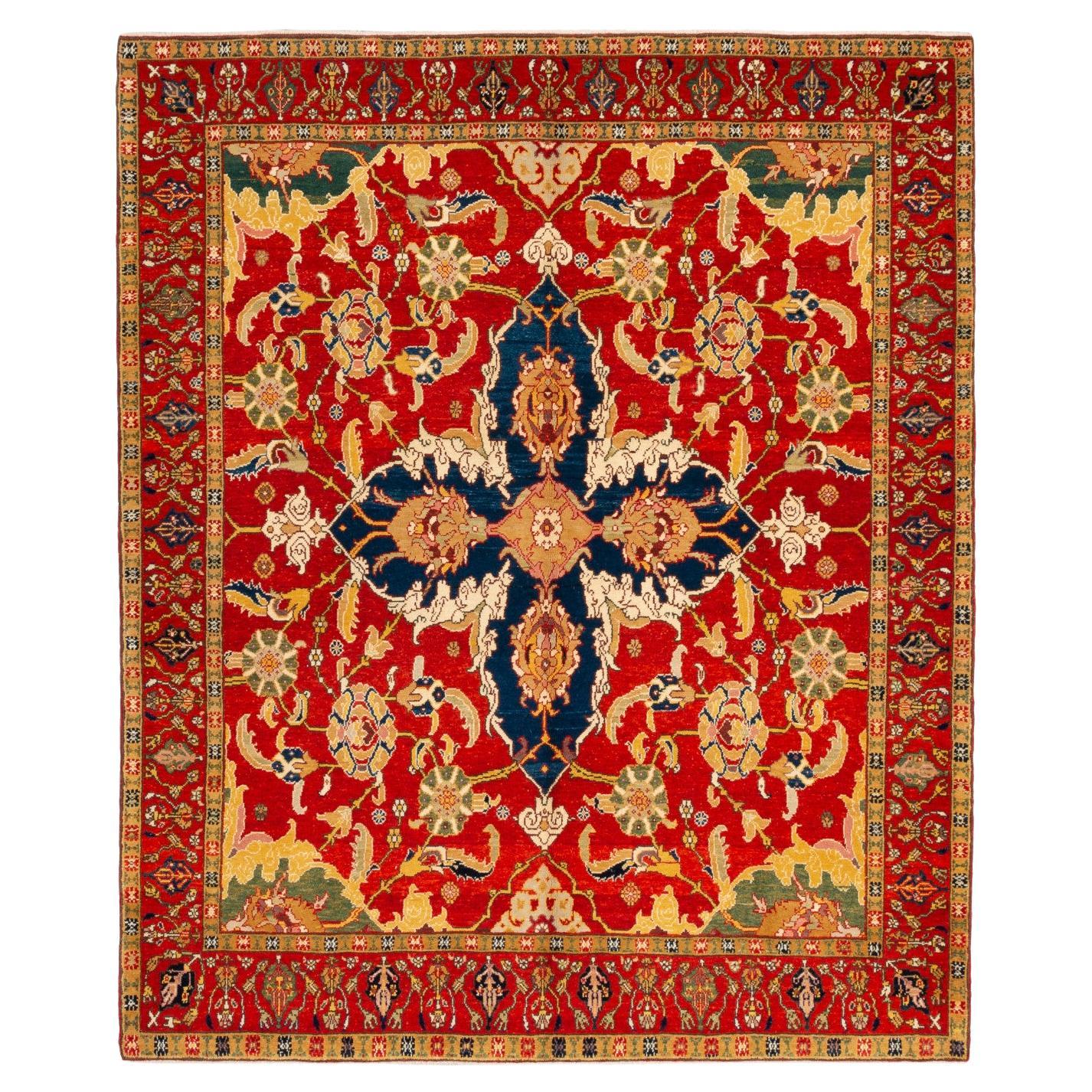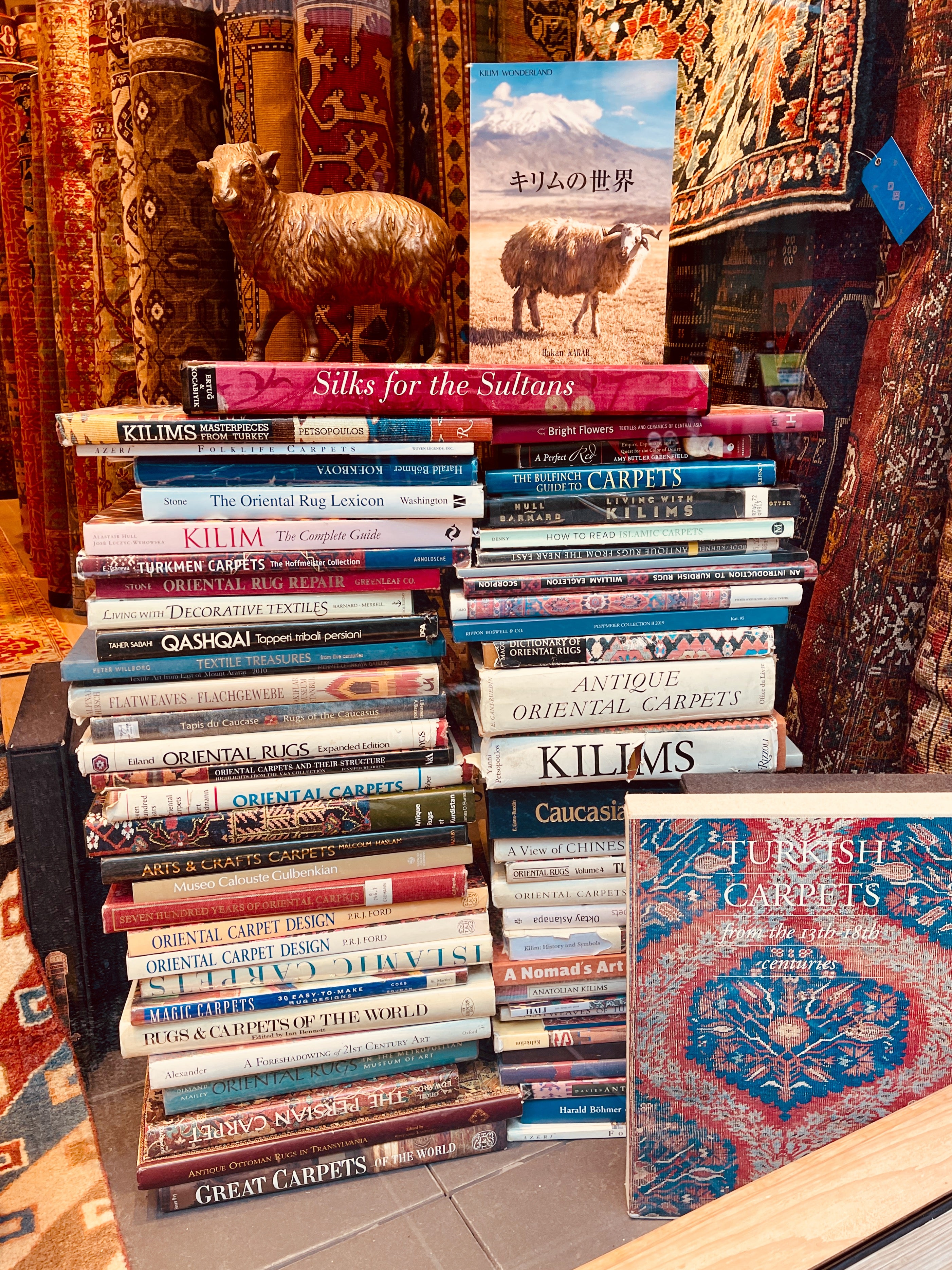Items Similar to Ararat Rugs Cairene Ottoman Carpet, Turkish Court Manufactury Rug, Natural Dyed
Want more images or videos?
Request additional images or videos from the seller
1 of 6
Ararat Rugs Cairene Ottoman Carpet, Turkish Court Manufactury Rug, Natural Dyed
About the Item
Turkish Court Manufactury Rugs were woven in the Egyptian workshops founded by Ottoman Empire in the 16th century. Those carpets were woven in Egypt, following the paper cartoons probably created in Istanbul and sent to Cairo at that time. The source of carpet comes from the book Antique Rugs from the Near East, Wilhelm von Bode and Ernst Kühnel, Klinkhardt & Biermann, Berlin 1958, pg.76. Shortly after its conquest by the Osmanli Turks (1517), a change of style was set in Egypt which, due to the establishment of a manufactory working for the court in Istanbul, found a particularly strong expression in the carpet industry. The Cairene Ottoman carpets correspond with those of the previous period both in material and in color range, and the palette is extended only through the more plentiful use of yellow, white, and a few other tints; occasionally, however, they were inclined to be satisfied with the three Cairene basic colors. Nevertheless, if there have been doubts expressed regarding the continuity of their production, these were based entirely upon the fact that the new rugs renounced completely the decorative orientation which had been observed up to that point. Vegetation which at times is naturalistic, at times stylized in a peculiar manner, is deployed luxuriantly and, in forms that are known to us from Turkish wall tiles and brocades, quite fills the field in endless continuation, interrupted by a large or a small medallion, quadrants of which are often repeated in the corners. Carnations, tulips, hyacinths, lilies, peonies, and other flowers, together with gracefully sweeping lancet leaves, sumptuous palmettes, and delicate sprays of blossoms, constitute the rich flora of these carpets, whose borders charm the eye with their elegant solutions for the corner problem, while in the guard stripes almost invariably little rosette-flowers appear all in a row. It is merely by way of exception that we will still find appropriations levied upon the Mamluk tradition, while, on the other hand, the coming revolution in decor is already heralded in a few specimens which we still count as belonging to the earlier group. In pure folk art, such a radical overturn would be quite inconceivable, but then in the operation of a manufactory, the introduction of a completely novel program can be accomplished with a minimum of confusion. With this change of orientation, it was significant that the idea of a governing medallion, even if with a different conception, had already been put to use. The design of this carpet is interpreted and soft colors are chosen by our designers for this carpet.
Color summary: 8 colors in total, most used 4 colors are;
Imperial Red 426 (Madder Root)
Yellow Green 419 (Henna - Indigo)
Sunray Color 405 (Henna)
Burlywood 135 (Spurge - Madder Root)
Group: Islamic Rugs Family
Area: Mamluk
Material of Pile: Natural Dyed Hand-spun Wool
Material Warp / Weft: Wool on Wool
Structure: Symmetrical knot on depressed warp inclining to the right
Knots Density: 39x39
Production Place: Southeastern Anatolia – Adiyaman
Location: Tokyo
Stock: In Stock
Dimensions:
4 ft 1 in x 4 ft 9 in ( 126cm x 146cm )
- Creator:Ararat Rugs (Manufacturer)
- Dimensions:Width: 49.61 in (126 cm)Length: 57.49 in (146 cm)
- Style:Revival (In the Style Of)
- Materials and Techniques:
- Place of Origin:
- Period:
- Date of Manufacture:2023
- Production Type:New & Custom(One of a Kind)
- Estimated Production Time:Available Now
- Condition:
- Seller Location:Tokyo, JP
- Reference Number:1stDibs: LU8206237887542
ARARAT RUGS
We know and believe that the geography we come from, our past, and our lifestyle are the most important bond between us to carry the oriental carpet art and culture to the next generations along with our core values in our ongoing growth journey.
We are aware that the way to achieve this goal and carry this priceless art and culture to the future depends on a lot of work with all our people every day while adhering to our core values.
For us, art is meaningful in the sense that it brings together various cultures around the world. It is an honor for us that oriental carpet art and culture have been instrumental in this for centuries and that we are a part of this business.
We are tirelessly keeping an eye on auction house information around the world about carpets. New York's Metropolitan, London's Victoria & Albert Museums, and other famous art museums, as well as small specialized museums that house private collections, and books about oriental carpets to collect information on outstanding carpet designs and patterns from around the world. It's our Self-improving and Self-developing culture.
As Turkish Culture of Hospitality, the Kurdish Culture of Generosity, and as Japanese Culture of Business Punctuality; are the most important values that this multicultural background has taught and bequeathed to us. It is essential and valuable for us that you feel this feeling not only by looking at our oriental carpets but from the moment you contact us.
About the Seller
5.0
Gold Seller
These expertly vetted sellers are highly rated and consistently exceed customer expectations.
Established in 1970
1stDibs seller since 2023
12 sales on 1stDibs
Typical response time: 1 hour
- ShippingRetrieving quote...Ships From: Tokyo, Japan
- Return PolicyA return for this item may be initiated within 7 days of delivery.
More From This SellerView All
- Ararat Rugs Cairene Ottoman Carpet, Turkish Court Manufactury Rug, Natural DyedBy Ararat RugsLocated in Tokyo, JPTurkish Court Manufactury Rugs were woven in the Egyptian workshops founded by Ottoman Empire in the 16th century. Those carpets were woven in Egypt, following the paper cartoons probably created in Istanbul and sent to Cairo at that time. The design source of the carpet comes from the book by McMullan, Joseph V., and Ernst J. Grube. Islamic Carpets. New York: Near Eastern Art Research Center, 1965. no. 6, pp. 36–37, ill. Shortly after its conquest by the Osmanli Turks (1517), a change of style was set in Egypt which, due to the establishment of a manufactory working for the court in Istanbul, found a powerful expression in the carpet industry. The Cairene Ottoman carpets correspond with those of the previous period both in material and in color range, and the palette is extended only through the more plentiful use of yellow, white, and a few other tints; occasionally, however, they were inclined to be satisfied with the three Cairene basic colors. Nevertheless, if there have been doubts expressed regarding the continuity of their production, these were based entirely upon the fact that the new rugs completely renounced the decorative orientation which had been observed up to that point. Vegetation which at times is naturalistic, stylized in a peculiar manner, is deployed luxuriantly and, in forms that are known to us from Turkish wall tiles and brocades, quite fills the field in endless continuation, interrupted by a large or a small medallion, quadrants of which are often repeated in the corners. Carnations, tulips, hyacinths, lilies, peonies, and other flowers, together with gracefully sweeping lancet leaves, sumptuous palmettes, and delicate sprays of blossoms, constitute the rich flora of these carpets, whose borders charm the eye with their elegant solutions for the corner problem. At the same time, in the guard stripes almost invariably little rosette flowers appear all in a row. It is merely by way of exception that we will still find appropriations levied upon the Mamluk tradition, while, on the other hand, the coming revolution in decor is already heralded in a few specimens which we still count as belonging to the earlier group. In pure folk art, such a radical overturn would be quite inconceivable, but then in the operation of a manufactory, the introduction of a completely novel program can be accomplished with a minimum of confusion. With this change of orientation, it was significant that the idea of a governing medallion, even if with a different conception, had already been put to use. This wool carpet presents a large border with repeating large blossoms, framing an extensive surface decorated with repeating chintamanis, the pearl-like spots that were popular in the Ottoman court. A circular medallion occupies the center, with a fleur-de-lis like motif at its top and bottom forming a vertical axis. The design of a central medallion and four corner quarter-medallions is thought to have originated in decorative book bindings. While displaying a Turkish design, the technique and materials of this carpet are actually Egyptian—reflecting the presence of Egyptian carpet...Category
21st Century and Contemporary Turkish Revival Turkish Rugs
MaterialsWool, Natural Fiber, Organic Material
- Ararat Rugs Cairene Ottoman Carpet, Turkish Court Manufactury Rug, Natural DyedBy Ararat RugsLocated in Tokyo, JPTurkish Court Manufactury Rugs were woven in the Egyptian workshops founded by Ottoman Empire in the 16th century. Those carpets were woven in Egypt, following the paper cartoons pro...Category
21st Century and Contemporary Turkish Oushak Rugs
MaterialsWool, Natural Fiber, Organic Material
- Ararat Rugs Turkish Court Manufactury Rug Ottoman Revival Rug Natural DyedBy Ararat RugsLocated in Tokyo, JPTurkish Court Manufactury Rugs were woven in the Egyptian workshops founded by the Ottoman Empire in the 16th century. Those carpets were woven in Egypt, following the paper cartoons...Category
21st Century and Contemporary Turkish Revival Turkish Rugs
MaterialsWool, Natural Fiber, Organic Material
- Ararat Rugs Turkish Court Manufactury Rug Ottoman Revival Rug Natural DyedBy Ararat RugsLocated in Tokyo, JPTurkish Court Manufactury Rugs were woven in the Egyptian workshops founded by the Ottoman Empire in the 16th century. Those carpets were woven in Egypt, following the paper cartoons...Category
21st Century and Contemporary Turkish Revival Turkish Rugs
MaterialsWool, Organic Material, Natural Fiber
- Ararat Rugs Turkish Court Manufactury Rug Ottoman Revival Rug Natural DyedBy Ararat RugsLocated in Tokyo, JPTurkish Court Manufactury Rugs were woven in the Egyptian workshops founded by Ottoman Empire in the 16th century. Those carpets were woven in Egypt, following the paper cartoons pro...Category
21st Century and Contemporary Turkish Revival Turkish Rugs
MaterialsWool, Natural Fiber, Organic Material
- Ararat Rugs Turkish Court Manufactury Rug Ottoman Revival Rug Natural DyedBy Ararat RugsLocated in Tokyo, JPTurkish Court Manufactury Rugs were woven in the Egyptian workshops founded by Ottoman Empire in the 16th century. Those carpets were woven in Eg...Category
21st Century and Contemporary Turkish Revival Turkish Rugs
MaterialsWool, Natural Fiber, Organic Material
You May Also Like
- Handmade Turkish Tulu Rug, 100% Natural Un-Dyed Wool, Modern Scandinavian CarpetLocated in Philadelphia, PA100% Natural Hand-Spun Wool of finest quality. These hand-knotted rugs are produced from scratch in our atelier located in Central Anatolia, famous for being one of the world's olde...Category
2010s Turkish Tulu Turkish Rugs
MaterialsWool
- Turkish Dyed Sparta RugLocated in New York, NYref c65057Category
Mid-20th Century Turkish Rugs
MaterialsWool
- Contemporary Turkish Patchwork Rug. Handmade from Over-Dyed Vintage CarpetsLocated in Philadelphia, PAAssorted pieces of mid-20th century hand knotted Anatolian rugs were washed, sheared, re-dyed in various colors, cut into geometric shapes then stitched together by hand to create th...Category
21st Century and Contemporary Turkish Modern Turkish Rugs
MaterialsWool, Cotton
- Contemporary Turkish Rug Over-Dyed in Black, Vintage Handmade CarpetLocated in Philadelphia, PAOur over-dyed rugs are all hand-knotted vintage pieces that are recreated in our workshop to cater to a wider range of interior design choices from modern to coastal, from industrial...Category
20th Century Turkish Modern Turkish Rugs
MaterialsWool, Cotton
- Contemporary Yellow Re-Dyed Rug, Vintage Handmade Carpet from TurkeyLocated in Philadelphia, PAOur over-dyed rugs are all hand-knotted vintage pieces that are recreated in our workshop to cater to a wider range of interior design choices from modern to coastal, from industrial...Category
20th Century Turkish Modern Turkish Rugs
MaterialsWool, Cotton
- 5.6x8.9 Ft Contemporary Turkish Rug Re-Dyed in Gray, Vintage Turkish Wool CarpetLocated in Philadelphia, PAOur over-dyed rugs are all hand-knotted vintage pieces that are recreated in our workshop to cater to a wider range of interior design choices from modern to coastal, from industrial...Category
20th Century Turkish Modern Turkish Rugs
MaterialsWool, Cotton
